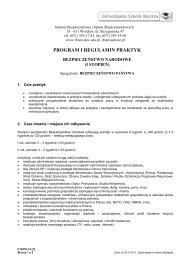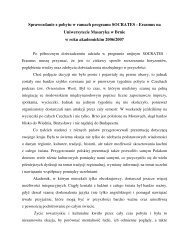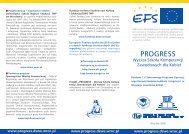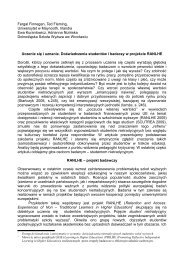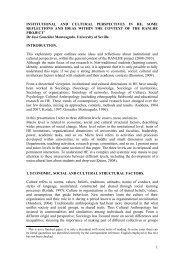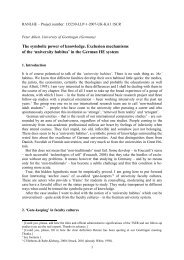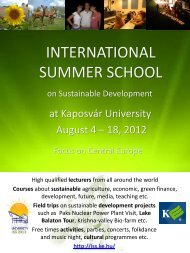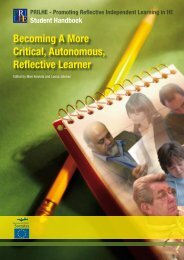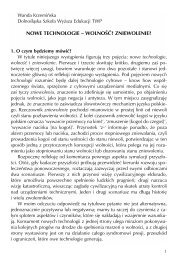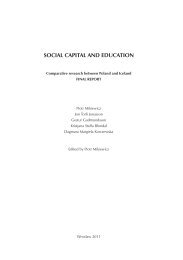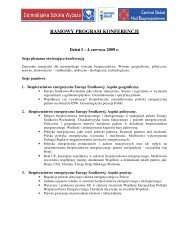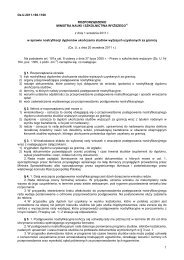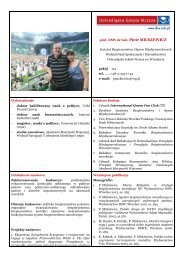Becoming A More Critical, Autonomous, Reflective Learner
Becoming A More Critical, Autonomous, Reflective Learner
Becoming A More Critical, Autonomous, Reflective Learner
Create successful ePaper yourself
Turn your PDF publications into a flip-book with our unique Google optimized e-Paper software.
PRILHE Project - Lecturer’s Toolkit<br />
In this context, Universities have the potential to play a vital role in the Lisbon objective and to equip Europe with the skills and<br />
competences necessary to succeed in a globalised, knowledge-based economy. Persistent mismatches between graduate<br />
qualifications and the needs of the labour market should be overcome,<br />
university programmes should be structured to enhance directly the employability of graduates and to offer broad<br />
support to the workforce more generally. Universities should offer innovative curricula, teaching methods and training/<br />
retraining programmes which include broader employment-related skills along with the more discipline specific<br />
(ibid: 6).<br />
Universities are key players in Europe’s future; for the successful transition to a knowledge-based economy and society, they<br />
should grasp the opportunities and challenges of the lifelong learning agenda.<br />
The PRILHE project has demonstrated conclusively that one of the new competencies required for the constant evolving labour<br />
market is for workers to become <strong>Critical</strong> <strong>Autonomous</strong> <strong>Reflective</strong> <strong>Learner</strong>s (CARLs). All in all, Universities have to increase the<br />
relevance of its education and training programmes, addressing the needs of society and of the business world by delivering into<br />
society lifelong learners, equipped with the new competences. The PRILHE project illustrates how to become a CARL; this should<br />
be at the core of the competences portfolio provided by Universities, not just for continuous personal and societal development but<br />
also to increase employability in the rather volatile labour markets of contemporary economies. Increasing student autonomy must<br />
be one of the goals of every HEI institution.<br />
2.1.3 Independent and creative learners and entrepreneurship, in the context of the Lisbon Strategy<br />
The new start for the Lisbon Strategy focuses the European Union’s efforts on two principal tasks – delivering stronger, lasting<br />
growth and providing more and better jobs. Entrepreneurship is positively correlated with growth; countries exhibiting a greater<br />
increase in entrepreneurship tend to show greater subsequent decreases in unemployment rates. <strong>More</strong>over, if Europe wants to<br />
successfully maintain its social model, in a scenario of a shrinking labour force, it needs more economic growth, more new firms,<br />
more high growth SMEs – in a word, more entrepreneurs wanting to take risks and embark on innovative ventures (Commission,<br />
2006b:3)<br />
Entrepreneurship refers to an individual’s ability to turn ideas into action (Commission, … 2005c:18); the foundations of<br />
entrepreneurship require the development of several generic attributes and skills, complemented by better and more specific<br />
knowledge about business. Entrepreneurship is a key competence for all, helping the individual to be more creative, self-confident<br />
enough to take risks in whatever function he/she is involved and to act in a socially responsible way (Commission, … 2006b:4).<br />
The Education and Training 2010 Work Programme (European Council, 2002) includes entrepreneurship as one of the key<br />
competences to be developed by all citizens (Commission, … 2005c: 18) An entrepreneurial attitude is characterised by initiative,<br />
pro-activity, and independence (autonomy) (ibid).<br />
In order to create the climate for self-employment and entrepreneurial activities among Europeans, entrepreneurship training<br />
should be integrated with different subjects at all education levels including tertiary level courses. The Commission (Commission…,<br />
2006b:12) foresees that,<br />
From 2007 the proposed new Community Integrated Programme on Lifelong Learning will support innovative projects<br />
with a European dimension, aiming to foster entrepreneurial attitudes and skills and to promote links between<br />
educational establishments and enterprises.<br />
To foster entrepreneurial mindsets, capable of creating businesses that can survive in global markets, students must be trained to<br />
develop these independent/autonomous thinking skills and to be creative in applying them. These skills can best be acquired<br />
through the life-long learning process; all educational institutions must, therefore, be competent in motivating and encouraging<br />
students to be <strong>Critical</strong>, <strong>Autonomous</strong> and <strong>Reflective</strong> <strong>Learner</strong>s. It must be a fundamental purpose of education to develop in<br />
individuals the ability to make their own decisions about what they think and do. The HEI mission must therefore be the<br />
development of skills of self-directed inquiry rather than just inculcation of course content, to produce not just knowledgeable<br />
persons, but lifelong self-directed learners. This indicates a need for different teaching-learning strategies designed to encourage<br />
and promote CARL<br />
12<br />
<strong>Becoming</strong> A <strong>More</strong> <strong>Critical</strong>, <strong>Autonomous</strong>, <strong>Reflective</strong> <strong>Learner</strong>




